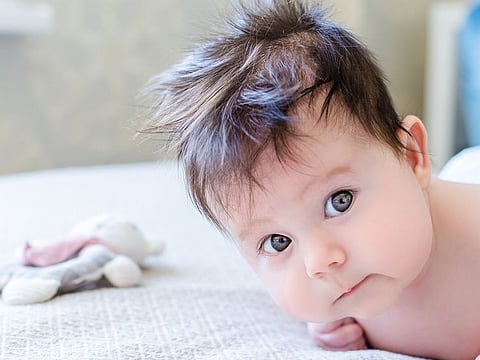Caring for newborns’ skin
Babies are soft and delicate and require special care and attention

A newborn’s skin will feel soft and cuddly to its caregivers, which is one of nature’s very clever ways of ensuring a baby has an adult to protect it.
Immediate skin-to-skin contact with the mother, for at least an hour after birth, is recommended by the World Health Organisation (WHO).
This type of ‘kangaroo care’ as it is also known is a recognised way of helping young and premature babies to stabilise and thrive.
The WHO also recommends delaying a baby’s first bath for 24 hours after birth.
A baby’s skin is very delicate, they are prone to getting rashes and allergies and with any affliction they are prone to getting infection.Mary Jutty Thomas, Paediatric Ward Nurse, DHA
When first born, a baby’s skin will be covered in a substance called vernix, that actually defends against infection. It’s a natural antibacterial cream.
By leaving this anti-germ barrier on their skin for that first 24 hours, they may be protected against bacteria like Group B Strep and E. coli.
After nine months of gestation, of being submerged in amniotic fluid, a baby’s skin will need time to adjust to its new outside world.
It may become dry and start peeling when first exposed to the air. There may also be fine hair covering parts of the shoulders, back and ears, that was also protective in the uterus, and will be shed within a week or two.
Differences to adults
Mary Jutty Thomas, a paediatric ward nurse with the Dubai Health Authority says infant skin is very different to adult skin and needs different care on every level.
“A baby’s skin is very delicate, they are prone to getting rashes and allergies and with any affliction they are prone to getting infection,” says Jutty Thomas.
She says that any baby who arrives on their paediatric care ward will have their skin care assessed on admission.
“We plan care according to the Braden Q scale, and depending on what score is received, we plan and start implementing our care,” says Jutty Thomas.
“At the time of admission, we check their mobility, skin texture and tissue profusion,” she says.
For babies who aren’t at risk of infection, and don’t have bedsores, a normal care plan will just include bathing in soap-free water.
Mild cleansers
If a cleanser is needed, only mild, neutral-pH soaps without additives are recommended.
Newborns don’t even need bathing on a daily basis. They don’t sweat or get dirty like toddlers, so three baths a week during baby’s first year may be enough and bathing more frequently could even dry out your baby’s skin.
“For those who have dry skin, after the bath we apply the moisture cream as per the doctor’s orders, and as the physician advises to apply the cream,” she says.
Her advice to parents is to apply a moisturiser designed especially for babies, and to do it straight after the bath, when the skin is lightly patted dry, but is still moist.
For babies who aren’t mobile, their skincare is a little more involved.
“They are prone to having bedsores, for these patients we give a daily bath. Along with that we make sure we give them a back rub in a rotational manner,” says the nurse.
“We also provide an air mattress so there is frequent movement. It’s not like on a flat surface which can cause sores due to the friction,” she says.
In cases where a skin disorder is present, care will be tailored to the requirements.
“For eczema patients, doctors might prescribe a lipo-based cream which is more effective, a more oily cream, applied intermittently with the normal moisturiser,” says Jutty Thomas.


